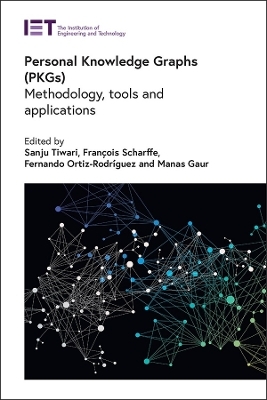
Personal Knowledge Graphs (PKGs)
Institution of Engineering and Technology (Verlag)
978-1-83953-701-1 (ISBN)
Since the development of the semantic web, knowledge graphs (KGs) have been used by search engines, knowledge-engines and question-answering services as well as social networks. A knowledge graph, also known as a semantic network, represents and illustrates a network of real-world entities such as objects, events, situations, or concepts and the relationships between them. This information is usually stored in a graph database and visualized as a graph structure, prompting the term "knowledge graph". Knowledge graphs structure the information of entities, their properties and the relation between them.
Personal knowledge graphs (PKG) encode the same information at an individual level and therefore vary widely. PKGs require the processing of each person's individual information and is constructed in an automated fashion. Once a PKG is constructed, it will be integrated in broader purpose KGs. A PKG is a representation of all relevant common-sense knowledge and personal data for a user and can support the development of innovative applications such as a digitalized personalized coach. It empowers stakeholders to make more effective decisions.
This book explores in a structured manner the global advanced research around PKGs to support the development of innovative digitalized personalized applications such as personal banking, personalized book-keeping, daily health-related activities monitoring and goal management tracking. The authors present methodologies, tools and applications including innovative topics tailored for PKGs such as named entity recognition and linking, construction approaches, modelling of personalization and context-awareness, evaluation approaches, relation extraction techniques, query answering in user specific knowledge graphs, knowledge representation and reasoning (KRR), visualization tools, integration tools and techniques, and fact summarization.
The book provides systematic coverage of this complex topic for researchers, scientists and engineers in both industry and academia working in data science, ICTs, knowledge engineering, semantic web, reasoning, information retrieval, and machine and deep learning with a focus on knowledge graphs. Advanced students with an interest in the field will also find this to be a useful resource.
Sanju Tiwari is a senior researcher at UAT Mexico. She is an experienced researcher and academician with 15 years of experience in computer science field. She is DAAD Post-Doc-Net AI fellow for 2021 and visited different German Universities under the DAAD fellowship. She is a mentor of Google Summer of Code (GSoC 2022-23) at DBpedia and a member of InfAI, Leipzig University, Germany. She is also working as a curator of ORKG Grant Program, at TIB Hannover, Germany. François Scharffe is an associate professor at the University of Montpellier, France. He is a knowledge scientist with a track record of improving data management in organizations through innovative research. He is also the founder and program chair of the Knowledge Graph Conference. His research interests include knowledge graphs, ontology engineering, data integration and AI. He holds a PhD degree in "Correspondence Patterns for Ontology Alignment" from the University of Innsbruck, Austria. Fernando Ortiz-Rodríguez is a full professor and director of the Research Institute at Tamaulipas Autonomous University, Mexico. He is a full professor and the artificial intelligence and innovation lab director, and research advisor for INDEX Mexico. He is a member of the Information Technology research group and part of the knowledge graph and semantic web community. His research interests include semantic web, information systems, e-government and artificial intelligence. Manas Gaur is an assistant professor in the Department of Computer Science and Electrical Engineering at the University of Maryland Baltimore County, USA. His research focuses on knowledge graphs (KGs), natural language processing, artificial intelligence (AI), and conversational systems for social good applications. With his PhD advisor, he co-created Knowledge-infused Learning, a new paradigm within NeuroSymbolic AI focusing on making KGs and knowledge workflows intrinsic components of AI.
Section 1: Introduction and overview
Chapter 1: Personal knowledge graphs: an introduction
Chapter 2: Applications of personal knowledge graphs
Section 2: Knowledge representation and reasoning
Chapter 3: Knowledge representation and reasoning in personal knowledge graphs
Chapter 4: From knowledge to reasoning, a cognitive perspective on personal knowledge graphs
Section 3: Data management and visualization
Chapter 5: Named entity resolution in personal knowledge graphs
Chapter 6: Relation extraction techniques for personal knowledge graphs
Chapter 7: Visualization tools for personal knowledge graphs
Section 4: Natural language processing
Chapter 8: Query-answering with text and knowledge graph
Chapter 9: Extracting personal information from conversations
Chapter 10: Fact summarization for personalized knowledge graphs
Chapter 11: Personalized recommender systems based on knowledge graphs
Section 5: Evaluation and other applications
Chapter 12: Evaluation approaches of personal knowledge graphs
Chapter 13: Personal health knowledge graph construction using Internet of Medical Things
Chapter 14: Integrating personal knowledge graphs into the enterprise
Chapter 15: Conclusion
| Erscheinungsdatum | 02.11.2023 |
|---|---|
| Reihe/Serie | Computing and Networks |
| Verlagsort | Stevenage |
| Sprache | englisch |
| Maße | 156 x 234 mm |
| Themenwelt | Mathematik / Informatik ► Informatik ► Datenbanken |
| Informatik ► Software Entwicklung ► User Interfaces (HCI) | |
| Informatik ► Theorie / Studium ► Künstliche Intelligenz / Robotik | |
| ISBN-10 | 1-83953-701-9 / 1839537019 |
| ISBN-13 | 978-1-83953-701-1 / 9781839537011 |
| Zustand | Neuware |
| Haben Sie eine Frage zum Produkt? |
aus dem Bereich


